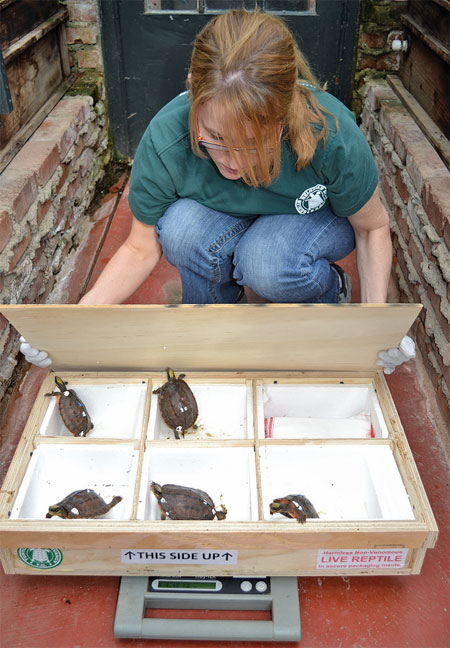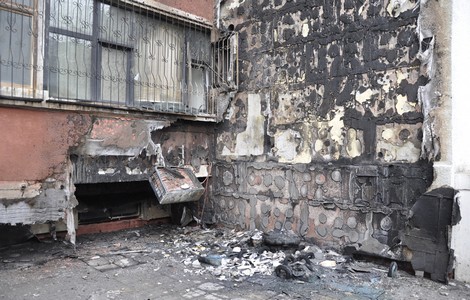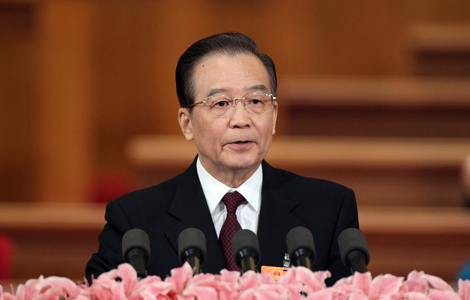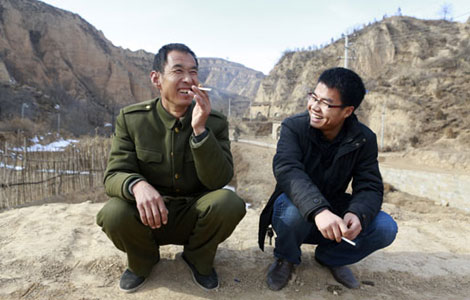Near-extinct turtles return home to Hong Kong
Updated: 2013-03-15 12:00
By Kelly Chung Dawson in New York (China Daily)
|
||||||||
|
A staff member of California's Turtle Conservancy checks the Golden Coin turtles before they were shipped to Hong Kong. Provided to China Daily |
With its "lucky" gold-yellow head and the rumored cancer-curing properties of its plastron shell, South China's Golden Coin Turtle has in recent years become one of the world's most endangered species of turtles. Illegal trade and increasing demand for a traditional Chinese medicinal tonic called turtle jelly (gui ling gao) has driven the market value of the species to unthinkable prices, in some cases as high as $25,000.
Five Golden Coin turtles bred in the United States were recently transported from California's Turtle Conservancy to the Hong Kong-based Kadoorie Farm and Botanic Garden in cooperation with the Hong Kong Agriculture, Fisheries and Conservation Department. The historic collaboration represents the first repatriation of captive-bred turtles from any country back to a species' native land, said Eric Goode, president of the Turtle Conservancy.
"This is an incredibly important development, particularly in China," Goode said. "This species is very close to becoming extinct in the wild, so it's a big step. As a result of the incredible newfound wealth of the Chinese middle class there's this whole new cultural shift: The Chinese are beginning to realize and recognize the importance of conservation. The majority of the country still doesn't think that way, but more and more Chinese are recognizing that it's important to protect natural heritage."
With more than half of all turtle and tortoise species worldwide threatened with extinction, the process of captive breeding and releasing animals into the wild is vital to environmental conservation, Goode said.
"Both the Hong Kong government and Kadoorie Farms had the political will and interest, so we were able to make this happen much more quickly than we expected," he said.
Paul Crow, senior conservation officer with the Kadoorie Farm and Botanic Garden in Hong Kong, said that both KFBG and the Turtle Conservancy are focused on conservation goals that target the recovery of critical species in the wild.
"This collaboration brings us closer to fulfilling this important objective for one of the world's rarest turtles," Crow said. "The animals being sent from the US [bring] invaluable genetic diversity to the project and hopefully may set an example that other organizations follow to assist in getting endangered species recovery projects active in wild range countries."
Collaborations between conservation groups in the US and China are vital to prevent the extinction of many species, he said.
"We all live on just one planet, so when a species is under threat we should all be trying our best to restore a balance," Crow said. "This type of collaboration is a taste of what is needed to combat many other threats currently facing our planet and our environment."
The Turtle Conservancy acquired the turtles when they were confiscated by US officials from smugglers in the rare animal trade, Goode said. The conservancy and KFBG began discussing the repatriation of the turtles in the fall of 2012 and after a bureaucratic process that included applying for export-import permits and vigorous health screening, sent the animals to Hong Kong via air shipment in early February.
The turtles will likely remain in quarantine at KFBG's facilities for a short period before they are "soft-released" into a secure, fenced area that approximates their natural habitat, Goode said. Although there have been similar successful releases elsewhere, a "soft release" will allow scientists to be certain that the animals are equipped to survive in the wild. The turtles will likely be tracked using radio transmitters affixed to their shells.
The date and location of the eventual release of the animals will be kept secret, Goode said.
"Not only are there very few locations where this can be done, but we also have to be extremely careful about protecting the location of the release because of how sought after these turtles are," he said. "They are immediately poached whenever they are found."
He described the security capacities of KFBG's facilities in Hong Kong as a "small Guantanamo for turtles". The site is equipped with motion detectors and an extensive camera surveillance system.
The value ascribed to the animals is rooted in the ancient Chinese belief that turtles represent longevity and fortune. Although the ingredients present in their shells have never been proven to cure cancer, a widespread belief in their healing powers has prevailed. Restaurants that specialize in turtle dishes have also increased in popularity in recent years. Additionally, Goode said the connotations of wealth and luck affixed to gold have led to a "self-perpetuating prophecy".
"Every culture has its issues," he said. "And although the country has done a great deal to protect panda bears, I think it's important that China is recognizing that they are not the only animals worthy of protecting. The more that we can show and demonstrate collectively that these animals have value that isn't just on the dinner plate, the better."
Kdawson@chinadailyusa.com
(China Daily 03/15/2013 page11)












